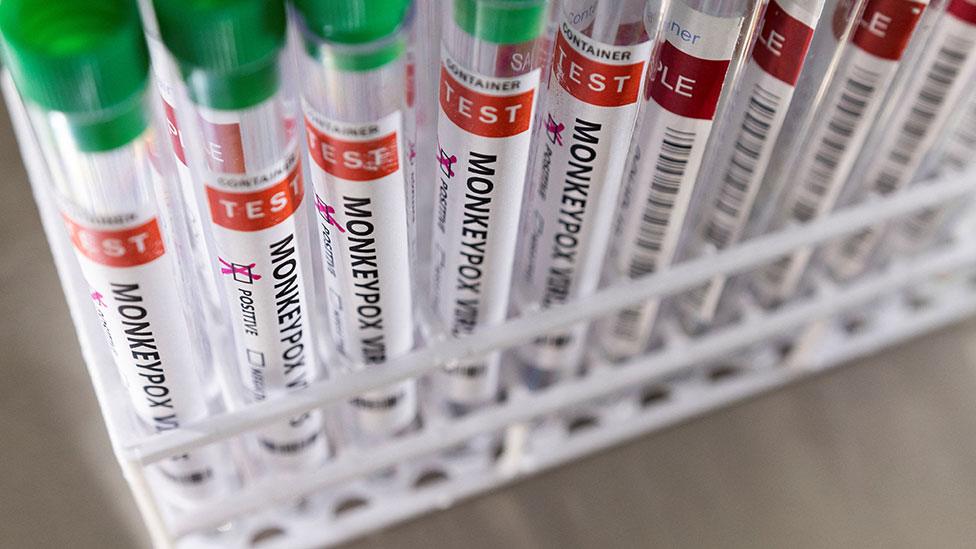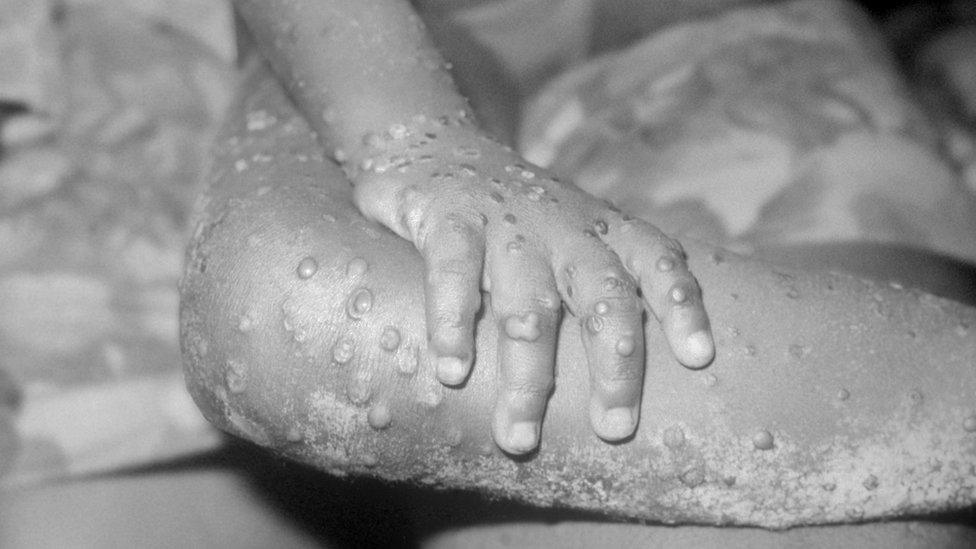Monkeypox: Risk is low in Scotland as 54 cases confirmed
- Published

The risk of the monkeypox virus to people in Scotland is low, according to a public health expert.
Prof Linda Bauld said only a small number of cases had been identified north of the border, it is a mild illness and there is a vaccine.
It came as the World Health Organisation declared the outbreak a global health emergency.
There have been 54 confirmed cases of the virus in Scotland since 23 May.
They are among 2,208 confirmed cases in the UK.
Most are men who are gay, bisexual or have sex with men. They are also linked to recent travel to London or Europe.
Prof Bauld, a professor of public health at the University of Edinburgh and chief social policy adviser at the Scottish government, told BBC Radio Scotland's The Sunday Show: "The risk to the public in Scotland remains low.
"The numbers are really small. It's a mild illness and we have a vaccine originally developed for smallpox.
"So it's totally different from Covid-19 and that's a very important point to make."
The virus is not sexually transmitted but it is passed by very close contact, she added.
"The reason the World Health Organisation has triggered this emergency response .... is to send a very clear message to a number of countries who may not be responding to this global outbreak that more action is needed," she said.
"I know we're still in and coming out of a pandemic, we are going to see diseases like this emerge but it needs to be put in a broader context and not alarm people."

What are the symptoms of monkeypox?

Symptoms of monkeypox include a rash which starts on the face and spreads to the body
Initial symptoms include fever, headaches, swellings, back pain, aching muscles.
Once the fever breaks a rash can develop, often beginning on the face, then spreading to other parts of the body, most commonly the palms of the hands and soles of the feet.
The rash, which can be extremely itchy or painful, changes and goes through different stages before finally forming a scab, which later falls off. The lesions can cause scarring.
The infection usually clears up on its own and lasts between 14 and 21 days.

Earlier Scotland's Health Secretary Humza Yousaf urged anyone with concerns to contact their GP or sexual health clinic.
In a tweet, he said: "While concerning, ScotGovt & PHS been working for many months on 4 Nations basis on our Monkeypox response."
"If you're concerned about possible exposure/symptoms, contact your GP or sexual health clinic if appropriate," he added.
Allow X content?
This article contains content provided by X. We ask for your permission before anything is loaded, as they may be using cookies and other technologies. You may want to read X’s cookie policy, external and privacy policy, external before accepting. To view this content choose ‘accept and continue’.
Public Health Scotland has said it is "generally a mild self-limiting illness" and most people recover within a few weeks.
Close contacts of people with the virus no longer need to isolate at home if they don't have symptoms.
Vaccinations are being offered to some men at higher risk of exposure to the infection and a small number of healthcare workers in high risk settings.
Dr Nick Phin, medical director at Public Health Scotland, said they know monkeypox is predominantly being spread through close skin-to-skin activity.
"The incubation period for monkeypox however is up to 21 days, so if you are aware that you are a close contact of someone who has tested positive, please do take additional precautions during this time," he said.
"These include avoiding close skin-to-skin contact with others, such as hugging, kissing, or sexual contact, even if you don't have any symptoms.
"If you do develop symptoms, you should self-isolate immediately and contact your GP or local sexual health clinic."
More than 16,000 cases of monkeypox have been reported in 75 countries, according to WHO director general Dr Tedros Adhanon Ghebreyesus.
He said there had been five deaths as a result of the outbreak.
There are two other health emergencies at present - the coronavirus pandemic and the continuing effort to eradicate polio.